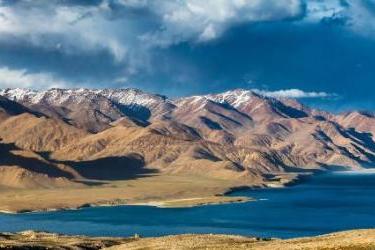Providing water resources and preserving established ecosystems is becoming one of the most important tasks facing the countries of Central Asia. And the new initiative of the President of Kazakhstan Kassym-Zhomart Tokayev, voiced at the meeting of the heads of state of this region in Turkmenistan, claims to become a kind of “road map” for solving this problem.
Since Soviet times, water has been the main strategic resource in the countries of Central Asia. The rapidly growing population and the high dependence of the agricultural sector of the economy on the availability of moisture made the water problem, perhaps, the most urgent in relations between the countries of this region – Kyrgyzstan, Turkmenistan, Tajikistan, Uzbekistan and partly Kazakhstan. According to scientists, over the past 75 years, the amount of water per person has decreased here by 4.6 times.
The severity of the water problem has repeatedly become a “bone of contention” already in the post-Soviet era. It came to armed clashes in the border regions, as was the case between Uzbekistan and Kyrgyzstan or Tajikistan and Uzbekistan … Each of the independent republics tried to control water resources, trying to take a more advantageous position to its geographical neighbor.
At the same time, in each of these republics there was an understanding that the problem of water use can and should be solved only together, taking into account the interests of each of the parties. But no one has proposed a specific implementation mechanism before.
And finally, at the recent summit of the heads of Central Asian states in Turkmenistan, these long-awaited initiatives were sounded by the President of Kazakhstan Kassym-Zhomart Tokayev. The Kazakh leader believes that for the joint effective management of the resources of transboundary rivers, and the introduction of advanced technological solutions, it is important to develop a consolidated water policy. And this interaction should be carried out on the basis of such principles as equal use, consideration of the interests of the parties and the full implementation of mutual obligations.
“Water for Central Asia should become a unifying and by no means separating principle. We are already experiencing the consequences of global warming in the form of low water and dry weather,” said Kassym-Zhomart Tokayev.
According to the President of the Republic of Kazakhstan, the most important aspect of the new water policy of the countries of the region is measures to digitize the systems of distribution, and accounting and monitoring of water resources. Over the next five years, Kazakhstan plans to digitize 119 channels with a length of about 3 thousand km. The implementation of these projects, according to the Head of the Republic of Kazakhstan, will save up to two billion cubic meters of water.
The Kazakh leader also called for the resumption of cooperation within the framework of the 1998 Agreement on the Use of Water and Energy Resources in the Syrdarya River Basin. To this end, he proposed to create a special working group at the level of vice-ministers, which, taking into account the needs of all sectors of the economy, could work out mutually acceptable solutions. He also noted the expediency of returning to the issue of creating an Interstate Water and Energy Consortium of Central Asia, which would harmonize the interests of all countries of the region in the fields of hydropower, irrigation and ecology.
At this seemingly purely regional summit, the President of Kazakhstan showed himself as a leader with a global mindset, reminding his colleagues of the proposal made at the 75th session of the UN General Assembly – to create an International Agency for Biological Security, and invited the leaders of the Central Asian countries to jointly promote this important initiative.
The leaders of other Central Asian states will surely find the strength to moderate their ambitions in the issue of exclusivity for the right to own water resources in the region and listen to the initiatives of their Kazakh counterpart. In such case in the very near future we may witness that an “apple of discord” will become in the foundation of stability and pragmatic management. /// nCa, 25 August 2021
